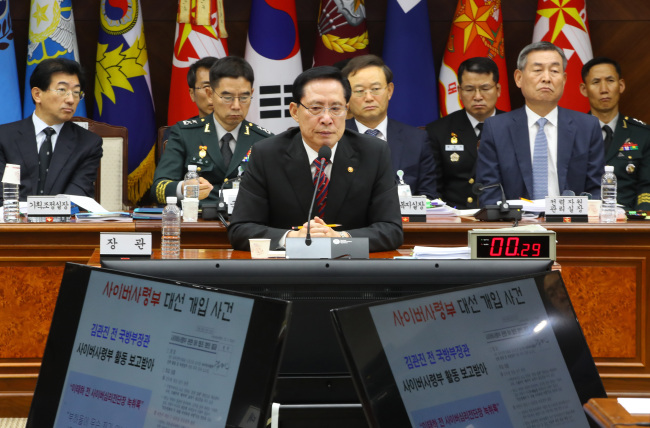South Korea and the United States will next month endorse a draft plan to establish a new command structure that will be applied when Seoul takes back wartime operational control of its country’s troops from Washington, Seoul’s Defense Ministry said Thursday.
The scheme will be approved when the allies’ defense leaders hold their annual Military Committee Meeting and Security Consultative Meeting from Oct. 27-28 in Seoul, said the ministry in a report submitted to lawmakers during the first parliamentary audit of the Moon Jae-in administration.
If the plan proceeds as scheduled, the “future command” will replace the current US-led Combined Forces Command, under which its four-star general serves as a commander. Under the new structure South Korea’s four-star general is expected to assume the commander’s role, while the US general will serve as the deputy.
“The new commander structure will employ a unified command structure led by a Korean commander and a US deputy commander,” the ministry said. “We will establish an operation procedure and command guidance next year.”

The ministry also vowed to complete the transfer of wartime operational control “promptly” and pledged to come up with a detailed roadmap next year. President Moon and his US counterpart Donald Trump agreed on the prompt transfer during their summit in June.
In 2014, South Korea and the US agreed to postpone the wartime OPCON transfer until Seoul secures necessary operational capabilities. Although they did not fix a date, officials and experts estimated the transfer would not happen until at least the mid-2020s.
However, some opposition lawmakers suspect that the timeline would be moved up a couple of years, suggesting that the allies’ might complete the transfer before President Moon Jae-in finishes his five-year term in 2022.
“We are going to take back wartime operational control in a prompt manner in accordance with the timeline and condition,” Defense Minister Song Young-moo told lawmakers. “It would be a prime opportunity to dramatically improve our military.”
The minister added, “there will be no way” for the US to conduct a pre-emptive strike against North Korea without consultation with South Korea. He also confirmed that the allies had “prior consultation” when US B-1B bombers flew across the Northern Limit Line in the East Sea in September.
Faced with North Korea’s escalating missile and nuclear threats, the ministry pledged to come up with a new operational concept by December. The scheme calls for a more offensive campaign to win a war as soon as possible while minimizing casualties, the ministry said.
For this purpose, the ministry pledged to achieve an advantage during the initial phase of a war by developing simultaneous striking plans and in-depth maneuvers. It will also work toward acquiring advanced surveillance and reconnaissance capabilities.
The minister said North Korea has yet to reach the level of fielding its nukes and use them on the battlefield ground. According to the ministry’s 2016 defense white paper, North Korea has about 50 kilograms of weapon-grade plutonium, capable of producing at least 10 nuclear weapons.
When pressed about a massive leak of classified wartime operational plans, the minister said, “There was nothing much to worry about.” Song vowed to “completely overhaul” the scheme, some of the classified scheme was compromised after North Korean hackers breached South Korea’s military intranet last year.
The parliamentary audit will run through Oct 31. A total of 701 organizations are subject to the inspection held by 16 parliamentary committees. It is the first parliamentary audit since President Moon took office in May.
In addition to the Defense Ministry, the Ministry of Foreign Affairs, the Ministry of Agricultural Food and Rural Affairs, the Ministry of Health and Welfare, the Supreme Court and others underwent the parliamentary audit Thursday.
During the audit on the Foreign Ministry, its Minister Kang Kyung-wha echoed criticism raised in South Korea against novelist Han Kang, who became the first Korean to win the prestigious Man Booker International Prize for her novel “The Vegetarian” last year.
Some conservative politicians and pundits accused the author of expressing a “problematic view” about the 1950-1953 Korean War, which she compared to a “proxy war” enacted by the great powers in her article posted at New York Times, titled “While the U.S. Talks of War, South Korea Shudders.”
“She might have a personal opinion as an author, but her expressions and historic views were problematic,” Kang told the lawmakers. “If she had consulted with me, I would have advised her not to post the article.”
By Yeo Jun-suk (jasonyeo@heraldcorp.com)




![[Herald Interview] 'Amid aging population, Korea to invite more young professionals from overseas'](http://res.heraldm.com/phpwas/restmb_idxmake.php?idx=644&simg=/content/image/2024/04/24/20240424050844_0.jpg&u=20240424200058)











![[KH Explains] Korean shipbuilding stocks rally: Real growth or bubble?](http://res.heraldm.com/phpwas/restmb_idxmake.php?idx=652&simg=/content/image/2024/04/25/20240425050656_0.jpg&u=)

